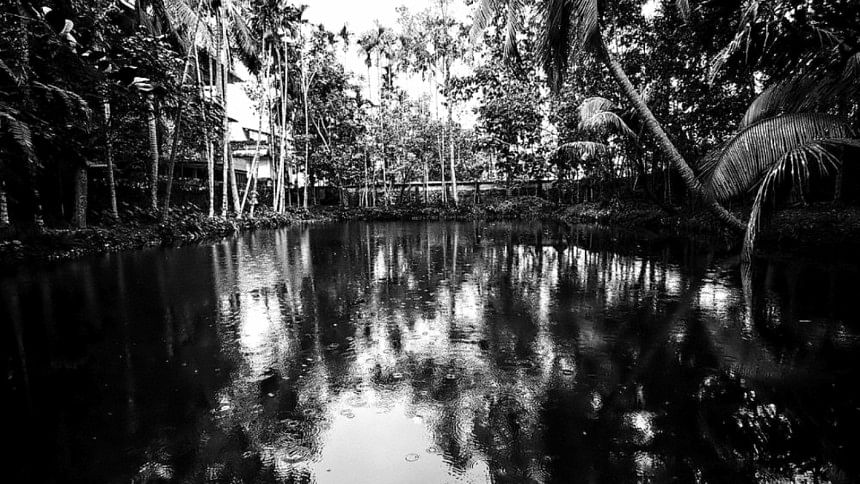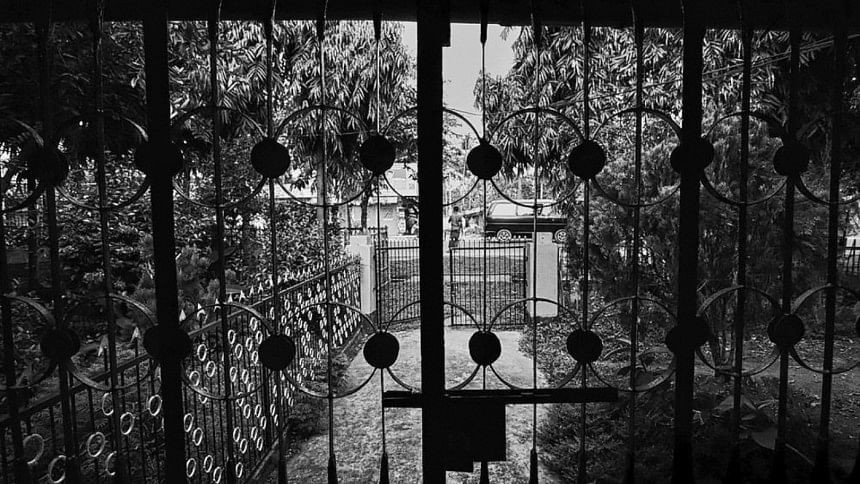Longing for a home long gone

On a dusky summer night in Sylhet, Mahfuz emerged from the darkness and stepped on a frog.
Dusk came rapidly that day. In the evening it had rained for an hour, forcing Nani’s chickens under the mango tree. The rains had brought with them an expected phenomenon: load shedding; and as the house plunged into darkness, candles found themselves in every room while outside, shadows wrapped themselves around palms.
The darkness was absolute. Unhindered, impermeable: a blanket of unending obsidian. Mahfuz in a Reebok tracksuit—all the rage in the 90s—had taken Orchee on a bicycle ride. When they returned, the frogs were waiting. The traditional route started on the road opposite the main gate, continuing past Motin Varieties Store (where Coke was Tk 10 and Fanta Tk 12), across the rail tracks (the cause of many a scraped knee) and down a little hill that continued on for two kilometres. At its end was a towering banyan tree which had to be crossed hurriedly while holding one’s breath, and to be avoided at all cost after sunset. Not because of ghosts and such, but because Ammu had said so. Beyond this point were the graves, little shrines in old Hindu houses bordered by bamboo. Little note on bamboo: they rustle with or without wind, something Orchee could neither comprehend nor explain. Asking Mahfuz was a waste of breath, the man knew very little about anything.
The bicycle rides often ended here, but if time permitted, there was more to explore. One and a half kilometre away from the graves was Marina tea garden: the crown jewel of an afternoon adventure. Often, Orchee and I (never together, except once, when two bicycles were available) would nag until Mahfuz or Mahbub complied. Marina, established in the old British days, was a small tea estate nestled in rural Kulaura where local picnics often found a home. The star attraction was a small waterfall, the kind that appear bigger to children than they actually are, making it a safe decision for all concerned. Note: I had actually taken a tumble down the waterfall (under the not-so-watchful eyes of Mahbub), resulting in bruises, a thoroughly wet shirt, and yet another scraped knee.
That was summer: bicycle rides on Nana’s old cycle. Today was Orchee’s turn and so I had stayed behind, waiting by the pond to spy on crabs.
As the first raindrops breached the still surface of the water, Shaju appeared, umbrella in hand. We stood together in silence for a while, watching crabs scurry back home, listening to the steady drip-drip of water on corrugated roof. My fishing line, nylon tied to bamboo, bobbed gently. I had forgotten about it.

As the winds picked up, Shaju turned to me. ‘Buru, cholo.’ For as long as I could remember, Shaju had called me buru: oldie. I was quite fond of the name (I was quite fond of Shaju). ‘Two more minutes,’ I muttered, turning my attention to the concave ripples melting into deep blue-green. Soon, the rain intensified and the fishing line bobbed faster; above us, the palms swayed like drunk heroes from sub-par Bollywood movies. With a sigh, I gave in.
The walk back from the pond to the house was short. Past the old cowshed and the remnants of a rose garden was a rusty tubewell leading to the courtyard. This was where Nani sat on her stool in the morning and swatted at flies. By the time we reached—I had been distracted by a duck running across my path—Ammu was at the door, her orna wrapped around her head, eyes squinting, lips pursed. ‘You’re going to catch a cold, Baba,’ she admonished. ‘The fish bite better in the rain,’ I muttered.
Inside, it was dry. Mosquito coils were being placed under tables, the walls, once white now a garish green, made the house look like the inside of a mossy aquarium. I wiped my feet on the welcome mat, propelled my wet slippers across the floor (Baba!) and hurried to Nani’s room to watch her pray.
She sat there on her favourite stool, head facing west feet barely touching the ground, eyes closed in concentration. When she looked up, I smirked and held her gaze. She fumbled with the surahs, soldiered on while I situated myself squarely within her line of sight. The next time she looked up, I had a plan of attack. Improvised dance. Legs akimbo, arms flapping everywhere, I treated her to my best impression of Mr. Bean. This time, it worked. She broke her prayer, looked up at me and seeing no remorse, half smiled and called for Ammu to come retrieve her son.
I ran.
For a long time, that was home, nestled snugly in the comfort of the known. This was before the barbed wires, the moving, the leaving: slowly at first, then all at once. There was little poetry involved, choices were made, options weighed. Nani was too old to take care of herself, we were too young to forego the privileges of America. The house that had given us the most wonderful summers couldn’t move, so it stayed. The roots of trees grew deeper, the cobwebs took over. In Nani’s bedroom, dust settled and thickened into grime.
As time stuttered to a stop in Sylhet, it sped up in New York. New babies were born, new rituals replaced the old. Here, afternoon adventures weren’t constrained by banyans, and there were bicycles aplenty. The rains were predictable, the electricity opulent. There were no mosquitos; the waterfalls, too, were much bigger than the one in Marina. Nani had the healthcare she needed, we the life we had always thought we wanted. Here, the frogs stayed away.
Some nights, something seemed off. The rains didn’t smell the same, and there were no ponds to watch crabs scurry around in. There were no palms, and no Shaju either. In sleepless New York, the walls seemed too white, the air insipid. Most evenings, Nani didn’t have any flies to swat so she sat by the window and waited for dusk to fall.
The last time I went back, the house lay forgotten, half of its rooms boarded up. The shrubs were overgrown, the gate rusty. Before Choto Mama left, he had sold off most of the trees and so now, for the first time in decades, the courtyard was flooded with light. Too much light.
Early one morning, unable to sleep I went outside to look for the mango tree of my childhood. On it, a lifetime ago, Orchee, Mahbub, Mahfuz and I had etched our initials, confident we would one day come back and find it again. But seemingly, we had been too confident: it too had receded into history. Perhaps a storm had knocked it down, or worse, it had been chopped down and auctioned off. Our lives are not as cohesive as we want them to be, and the fragments, more often than not, can be sold for parts.
The inside of the house was dusty, years of neglect lining its garish green walls. The kitchen, however, was spotless—overseen by Papiya, Shaju’s daughter, who was now in charge. She did what she could, but most nights, the neighborhood children jumped the fence to come steal coconuts. Ammu had come with me, and she now joined me in the living room. Two cups of tea steamed away on the table.
I had come to photograph the house one last time. There were talks of tearing it down, New York wanted to divvy up the land, then sell it to developers. There was business to be had, and money to be made. In the two days I had been here, I hadn’t gotten my camera out. Instead, I had spent Friday morning with Ammu coughing through Nani’s cupboards searching for old family albums. Then we’d sat, cha in hand in the overly lit courtyard looking through faded faces and weather worn prints. Here, Choto Mama had hair, there, ten-year old Bula was dressed as a bride. In time, passport-sized photos of cousins appeared. Time sped up now, Nani started looking older, the size of the annual family portrait dwindling as people left for America. With a turn of a page, the world was divided—newborn pictures either came in sepia or vibrant kodachrome, from Kollol’s Studio in Mini Shopping Complex or Rite Aid in Astoria. The album ended with a photo of Nani and Nana from back in the day, a lens flare standing in for a halo over Nana—his worn briefcase held tightly for him by Bula. I looked at that photo for a while, moving my fingers across the uneven creases of time. Outside, it had started to rain.
Huddled against the wind, umbrella in hand, Ammu and I made our way to the pond. The coconut trees were still there, their arms swaying like drunk heroes from sub-par Bollywood films. Very little else had stood the test of time. There were no ducks scurrying around, no chickens taking refuge under trees. The tubewell, long unused, lay forgotten like much else around it. Here, after Bula’s holud, we had gathered to laugh, here, on these steps, I had first conquered my fear of water. Somewhere in those murky depths, my eidi might still be rolling around in mud. My flight out was in two days.
As the rains intensified, I handed Ammu the umbrella and stepped out to Shaju’s usual hiding place for fishing rods. Sure enough, she had left one for me. Smiling, I launched it toward her favorite spot, and watched the nylon sink into the unknown. Taking off my slippers, I put my feet in the water, sending a lone crab scurrying to its hole. Out over the surface, little concaves of rain melted into deep blue-green. It seemed, for a moment, that nothing had changed, that back behind us, even now, mosquito coils were being lit, an impending load shedding was on its way, and Nani was getting ready for prayers. But everyone was gone, Nani was in New York, and time had made a mockery of the past.
We stood there for a while, the rain beating down on my back, sending tiny shivers up my spine. After a while, Ammu broke the silence:
“Baba, you’ll catch a cold.”
Laughing, I turned to her:
‘The fish bite better--
Imrul Islam works for The Bridge Initiative, a research project on Islamophobia in Washington, D.C. He is pursuing an MA in Conflict Resolution at Georgetown university.

 For all latest news, follow The Daily Star's Google News channel.
For all latest news, follow The Daily Star's Google News channel. 



Comments